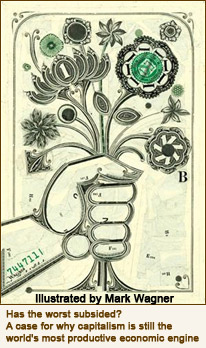Written by By Fareed Zakaria
Published by Newsweek on Jun 13, 2009
Editor's Note: Near the end of this article, Zakaria states that "not everything is written down and not everything that is legally permissable is ethical." This summarizes nicely his assault on what is wrong today that is not simply "capitalism" but instead specific elements of capitalism. I also worry about politicians actually using their roles in our government as a source for wealth building. This very provocative article may disturb you but hopefully will also stimulate a change in thinking. [more]
 The Capitalist Manifesto: Greed is Good (To a Point)
The Capitalist Manifesto: Greed is Good (To a Point)
Written by By Fareed Zakaria
A specter is haunting the world—the return of capitalism. Over the past six months, politicians, businessmen and pundits have been convinced that we are in the midst of a crisis of capitalism that will require a massive transformation and years of pain to fix. Nothing will ever be the same again. "Another ideological god has failed," the dean of financial commentators, Martin Wolf, wrote in the Financial Times. Companies will "fundamentally reset" the way they work, said the CEO of General Electric, Jeffrey Immelt. "Capitalism will be different," said Treasury Secretary Timothy Geithner.
No economic system ever remains unchanged, of course, and certainly not after a deep financial collapse and a broad global recession. But over the past few months, even though we've had an imperfect stimulus package, nationalized no banks and undergone no grand reinvention of capitalism, the sense of panic seems to be easing. Perhaps this is a mirage—or perhaps the measures taken by states around the world, chiefly the U.S. government, have restored normalcy. Every expert has a critique of specific policies, but over time we might see that faced with the decision to underreact or overreact, most governments chose the latter. That choice might produce new problems in due course—a topic for another essay—but it appears to have averted a systemic breakdown.
There is still a long road ahead. There will be many more bankruptcies. Banks will have to slowly earn their way out of their problems or die. Consumers will save more before they start spending again. Mountains of debt will have to be reduced. American capitalism is being rebalanced, reregulated and thus restored. In doing so it will have to face up to long-neglected problems, if this is to lead to a true recovery, not just a brief reprieve.
Many experts are convinced that the situation cannot improve yet because their own sweeping solutions to the problem have not been implemented. Most of us want to see more punishment inflicted, particularly on America's bankers. Deep down we all have a Puritan belief that unless they suffer a good dose of pain, they will not truly repent. In fact, there has been much pain, especially in the financial industry, where tens of thousands of jobs, at all levels, have been lost. But fundamentally, markets are not about morality. They are large, complex systems, and if things get stable enough, they move on.
Consider our track record over the past 20 years, starting with the stock-market crash of 1987, when on Oct. 19 the Dow Jones lost 23 percent, the largest one-day loss in its history. The legendary economist John Kenneth Galbraith wrote that he just hoped that the coming recession wouldn't prove as painful as the Great Depression. It turned out to be a blip on the way to an even bigger, longer boom. Then there was the 1997 East Asian crisis, during the depths of which Paul Krugman wrote in a Fortune cover essay, "Never in the course of economic events—not even in the early years of the Depression—has so large a part of the world economy experienced so devastating a fall from grace." He went on to argue that if Asian countries did not adopt his radical strategy—currency controls—"we could be looking at?.?.?.?the kind of slump that 60 years ago devastated societies, destabilized governments, and eventually led to war." Only one Asian country instituted currency controls, and partial ones at that. All rebounded within two years.
Each crisis convinced observers that it signaled the end of some new, dangerous feature of the economic landscape. But often that novelty accelerated in the years that followed. The 1987 crash was said to be the product of computer trading, which has, of course, expanded dramatically since then. The East Asian crisis was meant to end the happy talk about "emerging markets," which are now at the center of world growth. The collapse of Long-Term Capital Management in 1998—which then–Treasury secretary Robert Rubin described as "the worst financial crisis in 50 years"—was meant to be the end of hedge funds, which then massively expanded. The technology bubble's bursting in 2000 was supposed to put an end to the dreams of oddball Internet startups. Goodbye, Pets.com; hello, Twitter. Now we hear that this crisis is the end of derivatives. Let's see. Robert Shiller, one of the few who predicted this crash almost exactly—and the dotcom bust as well—argues that in fact we need more derivatives to make markets more stable.
Please click the link below to read the rest of the article: http://www.newsweek.com/2009/06/12/





